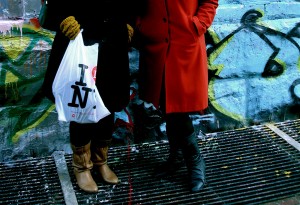…taking out the trash
During his term as Mayor of New York City, Rudy Giuliani instituted a comprehensive law enforcement plan that he believed would lead to an overall reduction in crime rates in his city. The plan? Clean the streets of New York. Keep them clean of trash, broken windows, graffiti, et cetera. The theory behind all this was that by changing small things in the environment, criminal activity would fall. Crime rates in New York City subsequently fell.
The bigger problems in life are hell to deal with. Sometimes they are large-scale issues such as eradicating racism or homophobia. Others are small, like developing good study habits or resolving to be more physically fit and active.

The way most of us address, or at least plan to address, these ordeals in life is to go at them head on. Identify the problem. Create a comprehensive plan to study every night. Figure out that if you work out for twenty-seven minutes between Bio and English Lit and again for thirty-three minutes after your last class before choir you’ll hit your personal target of sixty minutes a day. Decide that you will comprehensively address the problem by inviting speakers, by promoting changes to policy. And if that doesn’t work, overthrow the system. Start a revolution! No matter how much work it takes, it will get done!
And this game of theorycraft is great. If you plan accordingly and put the work in, you will succeed. But if you’re like me, that sounds like so much work. There’s only so much time in the day, the week, between meetings and classes, and that’s assuming I don’t want to hang out with friends or play video games or read a book or hang out with the boyfriend…and frankly, all of that seems so far away. Maybe I’ll just start on some parts. I mean, this is a plan with steps and phases right? I can do the rest next week.
The “big plan” approach has a fatal flaw. It’s much easier to say we’ll change habits A-Q than to actually do it. No matter how much work you put into thinking up the forty-seven part plan, it will fail if you don’t put in a significant amount of time.
Giuliani’s plan to reduce crime rates was based on the Broken Window theory, which was developed by social scientists James Wilson and George Kelling. Their theory says that if a building has a couple of broken windows for a few days, then observers will conclude nobody is really paying attention. So some kids break a window or two because it seems fun. Next someone breaks in and looks around this deserted building. Now, knowing it’s empty, people might start fires, or become squatters, or…
The theory put into action, then, says that if broken windows can snowball in to high crime rates, then fixing the windows and picking up the trash will cascade towards the opposite effect.
What trash in your life can you pick up? What little habits and excuses can you change to solve a problem?
E Pluribus had a great skit this past weekend. Briefly, the message was that, “I am just one person, I can’t do everything. But I am one person, and I can do something.” The point was that few people have the time, power and resources to eradicate racism. But, each of us can do little things to clean up the streets. If Gustavus as a community doesn’t tolerate small forms of hate, then they won’t escalate to anything larger. It seems like a small thing, but then again, it is a small thing. In fact, that’s what makes it perfect: it takes no time, but makes a difference.
Welcome to, or back to, Gustavus, Gusties. Hopefully this year we can clean up some trash.